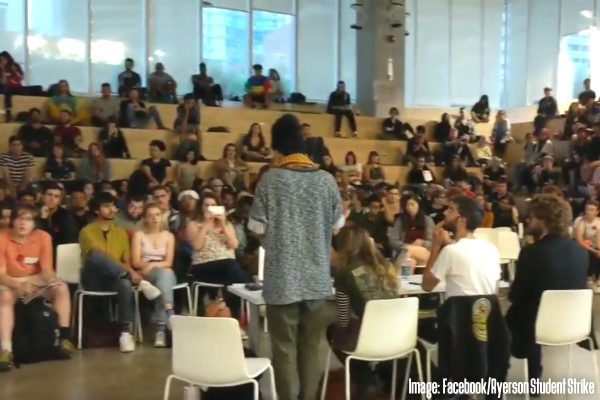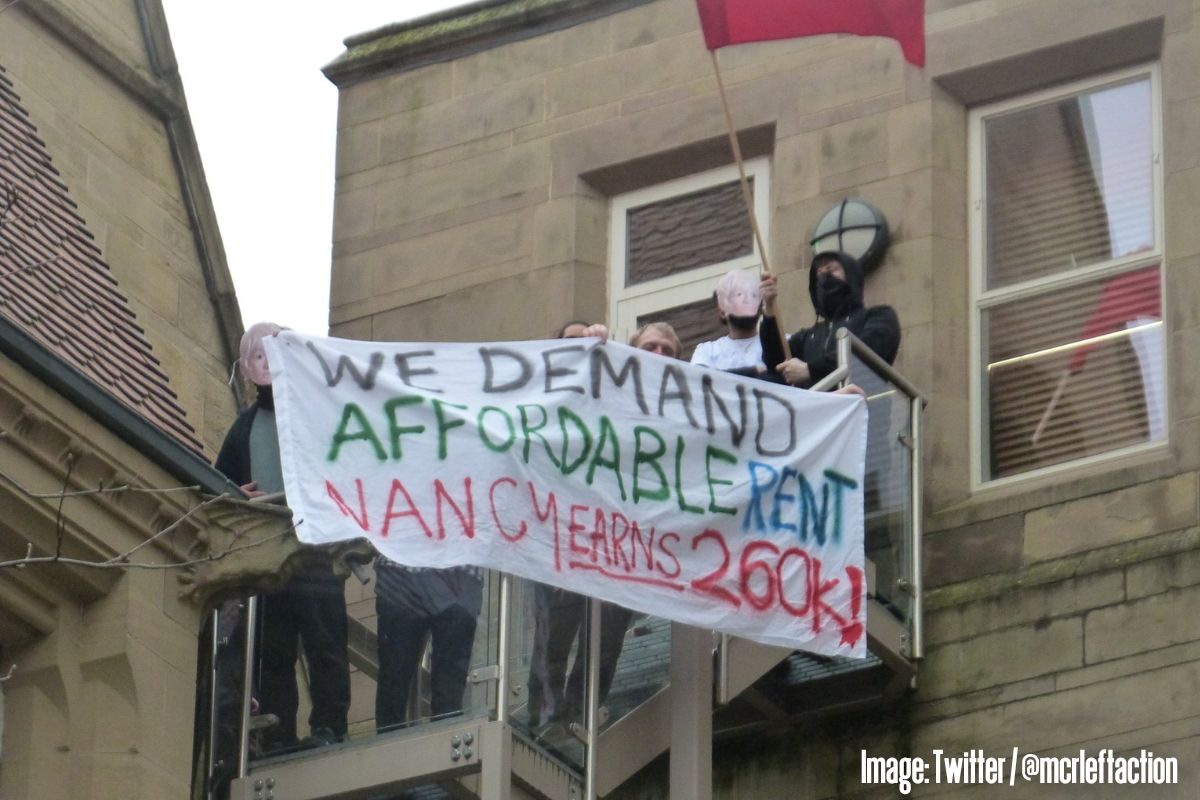Britain has been shaken to the core by the ongoing strike wave. Workers from all sectors are waging a fightback against the attacks of the bosses and the Tories. Now, taking inspiration from this action, students are also beginning to enter the fray.
This comes as no surprise. The marketisation of education has pushed students to the brink. Not only are students saddled with insurmountable debt in order to study, but they are forced to pay eye-watering amounts of rent to live in shoddy halls that more closely resemble prisons.
To make matters worse, the latest ‘increase’ in maintenance loans is well behind the rate of inflation. From this academic year to the next, students face up to an 11% real-terms cut in their maintenance income. In other words, the Tory government is letting students slip into deprivation.
As one student remarked in an interview with ITV news: “I know people who get their maintenance loan. They’re full-time students working two part-time jobs, and they’re still having to use food banks.”
Students are fed up. And as the pressure builds, explosive events are erupting on UK campuses.
Strikes

In recent weeks, students living in halls at the University of Manchester (UoM) have organised a rent strike, with around 350 tenants withholding rent worth up to half a million pounds.
This comes on the back of a similar campaign waged in 2020, which won a significant rent reduction for UoM students.
The demands of the rent-strikers include a one-off payment of £1,500 to keep maintenance loans in line with inflation, plus a backdated 30% reduction in rent for those living in student halls.
This is a welcome development. These demands, if won, would materially improve the conditions of students, even if only on a temporary basis.
With the cost of living set to soar even further in the coming year, however, and some international students facing a £2,000 increase in their tuition fees next year, it is clear that this payment would soon be swallowed up.
Importantly, in carrying out collective action, organised students are able to gain confidence in their potential power: to take on the fatcats in higher management; to win concessions through organised struggle; and, above all, to rely on their own strength.
The Marxist Student Federation therefore stands in full solidarity with those undertaking rent strikes.
When more local struggles like this emerge – and emerge they will – they should be linked together into a national campaign, with a clear set of bold demands. These should include free accommodation for all, as well as staff and student control over the university’s financial decision-making.
Occupations
As part of this rent strike campaign, beginning in February, a group of UoM students occupied three buildings on campus (including the building where the senior managers usually work), vowing not to leave until the rent strikers’ and UCU’s demands were met.
This was met with a harsh response by management, who have attempted to force entry into the occupied buildings. Furthermore, the university has denied food deliveries to the occupation, and have called in the police on one occasion.
URGENT: Security have just physically blocked a food delivery and told us we are no longer allowed to get essential supplies in pic.twitter.com/zcgWoIZPAq
— UoM Rent Strike 2023 (@rentstrikeUoM) February 18, 2023
Since then, management has threatened the occupiers with expulsion. We strongly condemn all of these attacks on the democratic right to protest.
The UoM occupation was followed by a handful of similar direct actions and sit-in protests at other universities, including Lancaster, Warwick, Leeds, and Sheffield.
Campaign
While we applaud the boldness of these actions, we must also make an honest assessment of whether stand-alone occupations offer a way forward for the student movement.
One thing must be made clear: an occupation should not be viewed as an end in itself; instead, it should be seen as a method that can be deployed as part of a wider campaign to mobilise and politicise students around a set of concrete demands.
For an occupation to succeed, it must connect with a broad layer of students and workers. Without an awareness and an understanding of why it is taking place, students and staff members are likely to react to an occupation with confusion or apathy.
Any occupation should therefore be built for in advance, involving the mass participation of students and workers on campus.
Every effort should be made, in this respect, to involve university unions – such as the UCU – in the planning of any occupation. Ultimately, it is only by linking up with organised workers that we can achieve our demands as students.
An occupation should have concrete aims and tasks from the outset. For example, an occupied space could be used to support workers’ action, by providing food and hot drinks for strikers, or by holding fundraisers.
In order to mobilise wider layers, the occupation should be used to hold teach-outs and political discussions on the pressing issues facing students and staff. Outreach stalls and door-knocking should be run – on campus and in halls – to build support amongst students. And delegations should be sent to picket lines and major workplaces, in order to forge links with workers.
Similarly, mass democratic assemblies should be organised and advertised to maximise participation, and to decide on key questions relating to the movement.
In this way, the occupation can be used as a platform to build a broader, stronger, sustained campaign of workers and students.
Mistakes
We are pleased to see that activists at UoM have adopted elements of this approach, by organising political discussions and supporting UCU members.
Unfortunately, however, there have been some serious flaws underpinning the recent actions undertaken at various campuses.
In most cases, the decision to occupy has been taken without any open discussion. In turn, occupations have been carried out by a thin layer of activists, without the involvement of the wider student body.
BREAKING: @rentstrikeUoM has taken over three buildings tonight. Here’s the moment students walked out of their lecture to find the engineering building had been taken pic.twitter.com/OLhUyC9YBY
— the manchester tab 🐝 (@thetabmanc) February 8, 2023
This is exemplified by a video of students walking out of their lectures in the UoM engineering building, only to discover that the building had been occupied right under their noses!
Instead of inviting students and staff into the occupied buildings, with the aim of building a mass campaign, the occupiers have in some cases resorted to barricading themselves in. This is the natural outcome of taking action over-and-above the heads of students themselves.
With this approach, the university management will always have the upper hand. They can sidestep any potential disruption by rescheduling lectures and meetings, or holding them online.
Management can even cut off utilities like heating and electricity to the building. One occupation in Manchester, for example, was forced to an abrupt end after management cut off WiFi access and turned off the heating. This also happened within a few hours of the occupation in Lancaster.
Ultimately, faced with such tactics, the bosses can wait it out until boredom and demoralisation set in. Furthermore, small groups of isolated occupiers are more vulnerable to being picked off and punished with disciplinary action.
Noticing the need to connect with broad layers of students, the occupiers at Manchester and Lancaster have correctly attempted to organise rallies to build support for their demands.
The response to this has generally been positive, showing the appetite that exists for a mass campaign against marketisation.
But unfortunately, this may be a case of too little, too late. Instead of the occupation supporting a wider student-staff campaign, the occupiers have been forced to build a campaign to support the occupation.
Consciousness

The experience of these occupations highlights an essential lesson for the student movement: a small handful of activists cannot substitute itself for the mass collective action of students and workers.
The inspiring example of the 2019 Ryerson student strike in Canada shows the way forward. Here, Marxist students built for a mass assembly of 200 students, which collectively made the decision to launch a strike against cuts to student loans.
The priority for all student activists should be to raise consciousness: to link the everyday problems that students and staff face to the need to kick capitalism out of education, and to run the whole of society along socialist lines.
What is needed, above all, is an organisation capable of leading a determined, revolutionary struggle on a national level.
Such an organisation must base itself on Marxist ideas, which are the only ideas that can provide a consistent class perspective and clear plan of action for the struggles ahead.
This is what the Marxist Student Federation is striving to build. We are educating students and young workers in revolutionary ideas, in order to transform society. We invite you to join us in this task!






